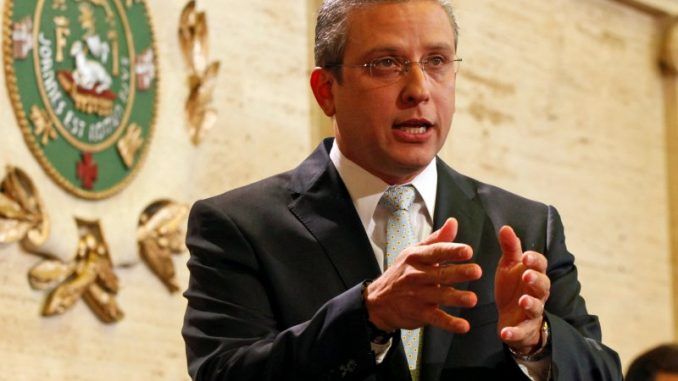
The governor of Puerto Rico, Alejandro Garcia Padilla, has said the island cannot pay over $70 billion of its debts, which could lead to a crash in the municipal bond market and higher borrowing costs for other States across America.
As the Greek crisis rocks financial markets this week, Puerto Rico’s problems could further plunge already unstable financial markets even further.
Washingtonpost.com reports:

BYPASS THE CENSORS
Sign up to get unfiltered news delivered straight to your inbox.
You can unsubscribe any time. By subscribing you agree to our Terms of Use
For many years, those bonds were considered safe investments — but those assumptions have been shifting in recent years as a small but steady string of U.S. municipalities, including Detroit, as well as Stockton and Vallejo in California, have tumbled into bankruptcy.
Those defaults at least offered investors the protection provided by Chapter 9 of the U.S. bankruptcy code, which sets out an orderly process by which investors can recoup at least some of their money. But like states, Puerto Rico is not permitted to file for bankruptcy. A failure to iron out an agreement with creditors could ignite an unwieldy, uncharted and long-lasting process to sort out the island’s financial obligations.
In addition, with as much as $73 billion in debt, the island’s debt obligation is four times that of Detroit, which became the largest U.S. city to file for bankruptcy in 2012.
The implications are serious for Americans outside Puerto Rico largely because many hold island bonds in mutual funds. At one point in 2013, an estimated three out of four municipal bond mutual funds held Puerto Rican bonds, which were attractive because of their high yields and exemption from federal, state and local taxes.
Puerto Rico’s governor, Alejandro Garcia Padilla, will seek concessions from creditors, which range from mutual funds in the United States to large hedge funds that have been buying Puerto Rican debt at high interest rates, in an effort to stretch out loan payments and drive down borrowing costs that are hamstringing Puerto Rico’s struggling economy.
“My administration is doing everything not to default,” Garcia Padilla said in an interview with the New York Times. “But we have to make the economy grow. If not, we will be in a death spiral.”
The government’s conclusion that it is unable to pay its debts was first reported by the New York Times. “It’s accurate,” said Gabriela Melendez, a Washington-based spokeswoman for the Puerto Rican government. She said the governor was scheduled to make a televised address updating islanders about Puerto Rico’s fiscal crisis Monday evening.
A U.S. commonwealth with a population of 3.6 million, Puerto Rico carries more debt per capita than any state in the country. The island has been staggering under the increasing weight of those obligations for years as its economy has tanked, triggering an exodus of island residents to the mainland not seen since the 1950s.
Meanwhile, the government has raised taxes, cut government employment and slashed pensions in a futile effort to get its debt burden under control. Those actions have only slowed the acceleration of debt creation, while harming efforts to reignite the economy.
The financial crisis in Puerto Rico has been playing out for years, although until now the government has been able to keep things moving by cutting spending and borrowing more and more money on Wall Street. But with rating agencies downgrading Puerto Rican debt to near-junk levels, the island has had to pay high rates to borrow money.
“What will happen is that our economy will get into a worse situation and we’ll have less money to pay them,” the governor said in the New York Times interview. “They will be shooting themselves in the foot.”
The island’s web of debt includes general-obligation bonds, which Puerto Rico’s constitution says must be repaid even before government workers receive their pay.
But billions of dollars more in bonds were floated by public corporations that provide critical services on the island, including providing electric power, building roads and running water and sewer authorities. Beyond the bond debt, the island owes some $37 billion in pension obligations to workers and former workers.
Puerto Rico has been pushing for Congress to grant bankruptcy protection for its public corporations, but that legislation has gone nowhere.


